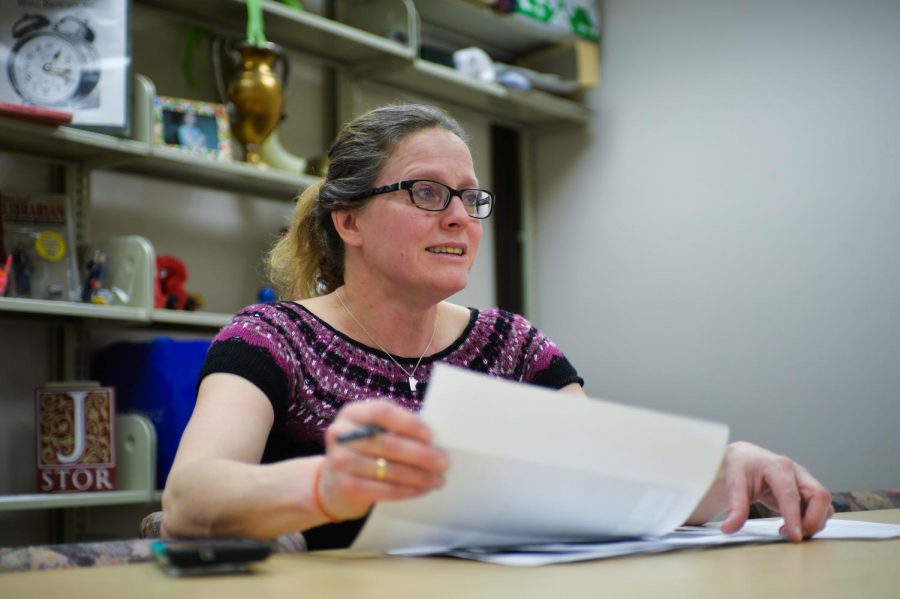Alumnus donates more than 450 Holocaust books to WSU library
Pullman High School graduate started collection after watching Anne Frank film 60 years ago
BENJAMIN MICHAELIS | THE DAILY EVERGREEN
Librarian Gabriella Reznowski reads the first-person account of Holocaust survivor Cecilie Klein-Pollack in, ‘Sentenced to Live: A Survivor’s Memoir.’ The book is currently on display at the Holland & Terrell Library atrium.
January 28, 2019
Around fourteen bookcases filled WSU alumnus Lawrence Seeborg’s basement.
“I was collecting faster than I can read them,” Seeborg said.
Seeborg, who is also a Pullman High School graduate, said he donated over 450 Holocaust-related books to WSU Libraries. He got interested in collecting Holocaust books after he watched the film “The Diary of Anne Frank” in 1959.
Seeborg said he was an avid reader when he was young.
“When I was a little kid,” he said, “they had contests at the Pullman public library [on] which kid could read the most books.”
Seeborg said he is interested in the twists of fate that allowed Holocaust survivors to persevere, as well as how they faced adversity in concentration camps. He became sympathetic to the authors of first-person narratives and gained more interest as he read more Holocaust-related books.
“Books will have a bibliography in the back,” he said, “so I go to those bibliographies in the back and look for new titles that I didn’t know about, and so one thing led to another.”
Gabriella Reznowski, a librarian at the WSU Holland/Terrell library, said the library will feature some of the books in the Terrell Library exhibit showcasing them until Feb. 3. She said collecting Holocaust literature is personal to him.
“They were just so … lovingly cared for,” Reznowski said. “He jacketed all of his books — they’re just in the most pristine condition.”
She said each book discussed unique experiences from different walks of life. One book that struck her in particular is a first-person narrative, “Sentenced to Live: A Survivor’s Memoir,” from Cecilie Klein.
Reznowski said the cover of the book was a photo of the Kleins’ mother, who was also holding her nephew. The mother heard from others in the camp that women, children and the elderly would be exterminated first. The mother thought that if she took the child, she could spare the life of the Kleins’ sister.
“You can really see this look on her face,” she said. “I can just imagine how torn she must have been. That one makes me cry.”
Reznowski said Klein-Pollack’s job throughout the whole book is to uplift her sister’s spirit, so she does not fall into total despair.
“A lot of these books were not necessarily written by professional authors, but people who, at a certain point, said, ‘I need to tell my story. I don’t want people to forget. I want people to hear me and remember the things I’ve seen,’” she said.
Seeborg said finding a way to ship his books from Utah to Pullman was a challenge. He placed the books in a total of 24 12-by-12-by-12-inch boxes. He shipped the boxes on a pallet and shrink wrapped it so the books would not move.
“I could’ve sold these books,” Seeborg said. “At least there’s gonna be a few of you who’s going to be interested — as long as there’s a few of that, I’m happy.”
Seeborg said he preserved his collection to remember those who had to experience the Holocaust firsthand.
“Maybe somehow, someway — when people look at the terrible thing that happened in World War II,” he said, “it won’t happen again.”
[googlepdf url=”https://dailyevergreen.com/wp-content/uploads/2019/01/holocaust-book-collection-list-of-all-books-1.pdf”]












barbara young • Jan 29, 2019 at 10:45 am
Regarding the article about Holocast books donated to the library. Was this article edited before it was published? For example: “I was (past tense) collecting books faster than I can (present tense) read them.” Mixed tenses in the same sentence.
I personally know Mr. Seeborg and know that his English is more sophisticated than the final sentence: “I could’ve sold… at least there’s gonna be a few of you who’s going to be interested as long as there’s a few of that, I’m happy.” To be quoted like that is an embarrassment.